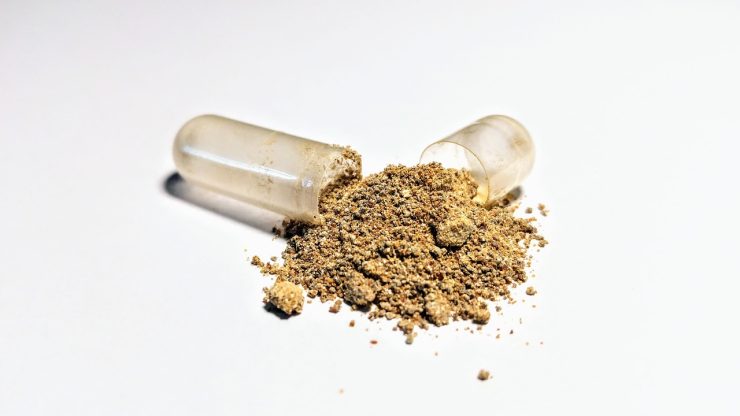The supplement aisle at my local health food store is like a tiny, magical apothecary. I’m talking about these adorable little bottles with names like “I Am Happy,” “I Am Focused,” “I Am Energized.” It all feels a bit like stepping into Alice in Wonderland, doesn’t it?
One day, curiosity got the better of me (and let’s be honest—who doesn’t want to be happier?), so I grabbed a bottle labeled “I Am Happy.” I’m generally a pretty upbeat person—I credit a lot of that to a healthy diet, good gut health, and regular workouts—but I figured it couldn’t hurt to try it.
And wow. I felt noticeably calmer, more focused, and yes—happier. Naturally, I flipped the bottle around to check the ingredients. Front and center: ashwagandha. Aha! That made perfect sense. From that moment on, I was hooked—and now, ashwagandha is part of my daily supplement routine.
So what’s the deal with this wonder herb?
What is Ashwagandha, Anyway?
Ashwagandha (also known as Withania somnifera) is an ancient herb that’s been used for centuries in Ayurvedic medicine. It’s known as an “adaptogen,” which basically means it helps your body deal with stress in a really balanced, intelligent way.
Adaptogens are cool like that—they work with your body. For example, ashwagandha can lower blood sugar if it’s too high, or help raise it if it’s too low. Same thing with thyroid function—it can support both underactive and overactive thyroids. You won’t find many (if any) pharmaceuticals that can pull off that balancing act.
And the benefits don’t stop there.
Stress Less, Live More
One of the biggest reasons people love ashwagandha? Its stress-busting powers. Chronic stress can do a number on your health—raising cortisol, throwing off your hormones, messing with your sleep, digestion, blood pressure, and more.
Ashwagandha helps calm that stress response. It reduces cortisol, eases anxiety, supports adrenal health, and even boosts DHEA (a hormone that helps with aging and energy). Plus, it’s been shown to lower heart rate, blood pressure, and a marker of inflammation called CRP (C-reactive protein).
A Cancer-Fighting Ally?
Believe it or not, ashwagandha also shows promise as a cancer-fighter. Research has found that it may help slow the growth of cancer cells—and in animal studies, it’s been shown to help fight breast, lung, colon, brain, and ovarian cancers.
One study on mice with ovarian cancer showed up to an 80% reduction in tumor growth when they were given ashwagandha (either alone or with other treatments). It’s believed that this is thanks to the herb’s immune-boosting and anti-inflammatory properties.
Bonus: when taken alongside chemotherapy, ashwagandha may help keep the immune system functioning better, which could help protect against infections.
Thyroid Support? Yep.
If your thyroid is out of whack, ashwagandha might help. Some studies have found it boosts T3 and T4 hormone levels—especially helpful if you have an underactive thyroid. But again, since it’s an adaptogen, it may help balance things on either end of the spectrum.
Quick heads-up: If you’re already on thyroid meds, talk to your doctor before adding ashwagandha into the mix, since it can affect hormone levels.
Brain Booster & Mood Lifter
Ashwagandha isn’t just about the body—it’s great for the brain too. It helps regulate mood-related neurotransmitters like serotonin and GABA, so it can reduce anxiety and even mild depression.
In fact, in studies, ashwagandha has performed just as well as some common anxiety and depression meds—without the side effects. It also supports focus, concentration, and memory, and may even help protect the brain from aging and degeneration (think Alzheimer’s).
One study showed that after just 20 days of supplementing, mice had better memory and reduced signs of cognitive decline. Not too shabby.
Blood Sugar, Cholesterol & Heart Health
Ashwagandha can help balance blood sugar and improve insulin sensitivity—helpful whether you have diabetes or just want to keep your levels steady.
It’s also been shown to lower LDL cholesterol and triglycerides. One study found a 17% drop in LDL in people taking ashwagandha, while another saw triglycerides fall by up to 45% in animals. These kinds of improvements can go a long way in protecting your heart.
Hormones, Fertility, and Testosterone
This one’s for the guys (and couples trying to conceive): ashwagandha has been shown to boost testosterone and increase sperm count and motility. In one study, 14% of the couples ended up pregnant after the men took ashwagandha. Not a bad side benefit!
For the Athletes (Or Just the Sore and Tired)
Ashwagandha may help with endurance and strength, which makes it popular among athletes. It helps reduce inflammation, supports recovery, balances stress hormones, and might even help with muscle gain and fat loss.
Taming Inflammation
Chronic inflammation is a root cause of so many health issues—heart disease, arthritis, even cancer. Ashwagandha’s natural anti-inflammatory properties make it a great ally. It boosts immune cells like natural killer cells and reduces inflammatory markers like CRP.
Many over-the-counter anti-inflammatories come with side effects—ashwagandha, on the other hand, helps the body heal while keeping the immune system strong.
How to Take It
Ashwagandha is generally considered safe, but like anything powerful, it’s not for everyone. If you’re pregnant, breastfeeding, or dealing with an autoimmune condition, check in with your doctor first.
Typical doses range from 250–600 mg per day. You can take it in capsules, powders, or even tinctures. Just look for a high-quality source—ideally organic and third-party tested.
So if you’re looking for a natural way to boost your mood, chill out your stress levels, improve brain function, support your hormones, and even protect against disease—ashwagandha might be worth a spot in your daily routine.











